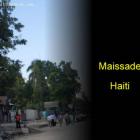ADVERTISEMENT
School - Haiti Observer Blog
School, Haiti Observer Blog. Read the following articles about School
College Regina Asumpta or Monseigneur Cousineau in Cap-Haitian
The college, Regina Asumpta opened its doors as the first all-girls High School in Haiti's northern region and is today the only institution that operates a primary and secondary school, as well as a university of exclusively female students.
At the time, 1958, under the name of the bishop Albert Francois Cousineau, who traveled to Canada and found the Holy Cross Sisters, who oversee its running, the school was simply an all-girl high school. College Monseigneur Cousineau changed its location soon after opening as well as its name and has retained both changes for over 50 years.
College Catts Pressoir, Haiti
Seeking to provide the greatest number of students they can with the highest level of education is the edict of the Collège Catts Pressoir in Port-au-Prince on Martin Luther King Avenue. An ambition even more to be admired as, when it was started in October of 1955 by Jeanine Vaval Laroche and her husband Ernest, the college was located then in the tiny room of a house on Nazon Alley.
Special programs included private lessons taught by Jeanine, and the school also catered to students who had difficulties in learning. Very early College Catts Pressoir made a promise to provide competent, learned and charismatic teachers to impart the necessary skills and requisite education through advice and explanation to the students, and they quickly established the confidence of parents, causing the demand for places at the school to rise. This led to a move to a building, currently the computer lab at the new location.
Quisqueya Christian School an Elite Academic Institution
Quisqueya Christian School (QCS) in Haiti is one of a network of private Christian college-preparatory schools, scattered around the world. Its mission is to offer an American school-based curriculum for students, kindergarten to high-school age. In addition, the school incorporates Christian theology into its classes to orient children to the Christian values and beliefs that form its world view.
Two accreditation bodies, the Association of Christian Schools International and Advanced, have approved the academic standards of Haiti's QCS. Known as an academically-superior teaching institution, QCS's students have matriculated to such highly-regarded U.S. schools as Chicago, Brown, Cornell, and Duke Universities.
Lycee Alexandre Petion a Pale Ghost
The Lycée Alexandre Pétion was founded in 1816 by its namesake, Haiti's third president. A high school located in Port-au-Prince, it educated the Haitian ruling class. Government ministers, Parliament members, and many of Haiti's rulers studied there. The school was established to educate the elite class and counted among its former students notable authors as well.
Lycée Pétion maintained its high academic standards for decades, but gradually became eroded by frequent government upheavals, and a stagnant economy as a consequence. For 150 years, the school boasted an excellent French-trained teaching staff. Math and science labs were fully equipped, and when textbooks frayed, or equipment no longer functioned well, it was replaced without hesitation.
Institution Saint-Louis de Gonzague, Haiti
Institution Saint-Louis de Gonzague, Haiti is a primary and secondary Roman Catholic school located in Haiti. Freres de l'Instruction Chretienne or F.I.C. or Brothers of Christian Instruction run this school. The official colors of the school are green and red. It is the island nation's most prestigious school that was established in the year 1890 at rue du Center located at downtown Port-au-Prince. It was first opened for students belonging to the age group of 6 and 12. The institution started offering degree courses for the secondary school by the year 1930 and the school experienced a major expansion during the early phase of 1970s.
Ecole Elie Dubois in Port-au-Prince
Ecole Elie Dubois in Port-au-Prince is a vocational school for girls. It is located only 2 blocks away from the Presidential Palace located at downtown Port-au-Price. This vocational school is run by 7 nuns. These nuns, including director Soeur Josette, used to live in the campus of the Ecole Elie Dubios School before the Island country was hit by the devastating earthquake in 2010. As of date, these nuns commute across the capital city Port-au-Price. The school campus has several historic buildings that were damaged because of the earthquake but are currently being restored along with rest of the campus.
College Notre Dame Du Perpetuel Secours, Cap-Haitian
College Notre Dame Du Perpetuel Secours, Cap-Haitian is Roman Catholic private primary and secondary school for males only. Congregation of Holy Cross in Cap-Haïtien established the school is Haiti in the year 1904. 4 secular Catholic Priest originally ruled the school but the Brothers of Christian Instruction also presided over the school. The Brothers of Christian Instruction also presided over various educational institutions of religious foundation spread through the island country. Over 90% of the College Notre Dame Du Perpetuel Secours, Cap-Haitian attend some institution for higher education of which, the Universite Notre Dame d'Haiti is the most prominent one.
Collge Canado-Haitien, Port-au-Prince
Located at Port-au-Prince in Haiti, the Collège Canado-Haitien is a school that was established in 1969 in Turgeau. The school was founded by Brothers of the Sacred Heart. Canado-Haitien later integrated students attending high school in other schools founded by Brothers of the Sacred Heart like Saint-Jean L'Evangeliste, Pope John XVIII School and Liberia School. The Canado-Haitien also served students of other schools like Saint-Louis de Gonzague School, The Petit Séminaire Collège Saint Martial and others.
Collège Canado-Haitien had a four-floor campus before the 2010 earthquake and consisted of 31 classrooms, the secretariat, a cafeteria, a library, an auditorium, the Direction (place for bureau of counselors, asst. principals and principals), two volleyball and two basketball courts. Right next to the Collège Canado-Haitien was the center of Canado-technical center. The building of Canado-technical center was also hit by the earthquake and was damaged severely. It is now being repaired. The Collège Canado-Haitien was hit badly and of 31 classrooms, only 3 are intact. The Direction, the secretariat and the cafeteria were not harmed by the earthquake.
Haiti, one of 8 countries in the world half of its children not attending school
Of 8 nations in world where half of the children don't attend school, Haiti is one of the countries. It is because of this reason that Laurent Lamothe - Prime Minister of Haiti and Vanneur Pierre - Minister of Education for Haiti attended a meeting with UNESCO in Washington D.C. along with the ministers of the 7 other nations. The other nations include South Sudan, Yemen, Nigeria, India, Ethiopia, the Democratic Republic of Congo and Bangladesh.
UNESCO called this meeting to discuss the challenges faced by these countries and the steps that can be taken to open doors for education for the children. International Monetary Fund and World Bank hosted a ministerial meeting on April 18 with a theme called 'Learning for All'. Michaëlle Jean, UNESCO Special Envoy for Haiti also attended the meeting. It was informed to the press by Michaëlle Jean that she participated in the round table that dedicated specifically for Haiti alongside Vanneur Pierre, Laurent Lamothe, Irina Bokova (Director General of UNESCO) and Gordon Brown (US Special Envoy for Global Education).
Populist President Dumarsais Estime
Dumarsais Estime, Haiti's 33rd president, held office for four years. His presidency is notable because he was the first black leader elected after the U.S. occupation ended in 1934.
Although Estimé married a mulatto elite, his determined educated blacks were to make up the majority of his administration's political appointees. Reversing mulatto elite influence, he championed an education initiative, building schools in poverty-ridden villages and offering advanced teacher-training. This effort created a 45% rise in elementary school attendance.
Dumarsais Estime's agenda included road-construction projects, literacy programs, and improving community services. He also amended the Constitution to provide workers the right to form unions and raised the minimum wage.
Our objective is to share with you news and information about Haiti and the people of Haiti. Traditions, habits and the way we were or grew are alive in this site. We highly recommend that you Subscribe to our Newsletter and also share with us some of the things that are memorable and made us unique people.

 Maissade, Haiti
Maissade, Haiti  Informative Marketing and Advertising in the Haitian Community
Informative Marketing and Advertising in the Haitian Community  Something to think about
Something to think about  Haitians are a Proud People
Haitians are a Proud People  Newsletter
Newsletter